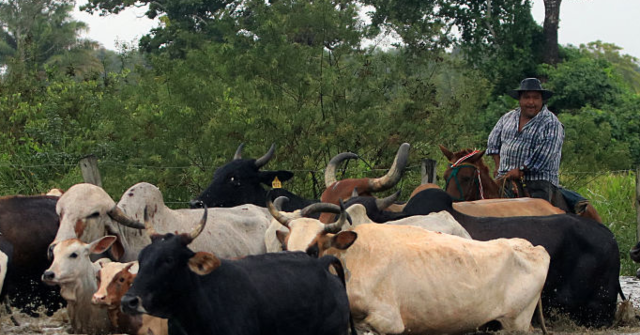An intrepid Catholic priest documented what he alleges is a trove of evidence that German carmaker Volkswagen trapped and effectively enslaved hundreds of Brazilian workers at a cattle ranch in the Amazon between 1977 and 1987, The Washington Post reported on Wednesday, citing the documentation.
Father Ricardo Rezende Figueira reportedly led an extensive investigation and compiled over 1,000 pages containing dozens of testimonies from victims, notarized declarations, official government and police reports, and other pieces of information corroborating the forced labor conditions that hundreds, including children, allegedly endured.
The incidents allegedly took place during and after the military dictatorship in Brazil, which lasted from 1964 to 1985. Volkswagen, the then-largest carmaker in Latin America, owned a property at the time through a subsidiary in the Brazilian Amazon known as Vale do Rio Cristalino (Crystal River Valley), a cattle ranch nearly twice the size of New York City.
In response to the Washington Post, Volkswagen Brazil did not deny owning the cattle ranch, but did state it “categorically refutes and rejects all allegations” of abuse at the site. It added that it “remains committed to the pursuit of justice.” Volkswagen’s headquarters in Germany did not respond to the Post.
The extensive dossier, which Rezende first gave The Washington Post access to in March, identified 69 alleged victims, who are now elderly. The documents recounted how labor recruiters lured hundreds of seasonal and often illiterate informal workers to work for Volkswagen’s Brazil subsidiary property in the Amazon with the “promise of a good pay and a better life.”
After being led to the ranch, according to the report, the workers were forced to work subjected to degrading acts such as brutal physical violence, torture, debt bondage, armed oversight, restricted movement, and exposure to disease. The Washington Post stated in the report that it interviewed 29 people with knowledge of the Volkswagen ranch, of which 16 said they worked on the property and nine alleged they had been effectively enslaved.
“But once on the farm, the workers said, they were trapped — geographically isolated, ensnared by debt, sickened by malaria, and forced to toil under threat of violence. Their job was to destroy the forest and make room for cattle,” the report read, citing the testimony of a man who declared that they worked “Monday to Monday, often without eating,” and “they promised to kill us.”
The report recounts the testimony of 60-year-old Pedro Valdo Pereira Vasconcelos, who said he was taken to work at the Volkswagen cattle ranch when he was 17 alongside some of his friends, including José Ribamar Viana Nunes who was 18 at the time.
The then-teenagers were allegedly lured by a mutual friend identified as “Batista” who was looking for men to work at the Volkswagen ranch, offering “good pay, enough to help their families,” and touting that the workplace had a purported “soccer field.”
“The men never played a game in their three months at Rio Cristalino. Instead, they said, they were ‘sold’ to [Brazilian contractor company] Chicô, who placed them under the supervision of four armed inspectors,” the report claimed. “In the forest labor camps, they stuck close to one another. One man sick with malaria perished of malnutrition, they recounted; another was shot in the leg; a woman was raped as punishment for her husband’s attempted escape.”
The report also noted that, in recent years, Father Rezende successfully interviewed five men who escaped from the Volkswagen ranch in the past and are now in their 60s. The Washington Post spoke with the escapees, noting that one such man, identified as 62-year-old Francisco Rezende de Souza, “could barely walk” and when he spoke “it was little more than a murmur.”
“His months on the Volkswagen ranch, his friends said, had broken him. After his escape, he had begun to drink heavily, always the Brazilian liquor cachaça,” the report read.
“He was never able to hold down a job,” a friend of the man identified as 75-year-old Antônio Eliseo Gobatto told The Washington Post in April. “Never had a girlfriend, never married. He always felt diminished in everything.”
The outlet claimed that despite multiple investigations by local police and other authorities, no legal action against Volkswagen or any related company was taken at the time. Father Rezende reportedly approached federal prosecutors in 2019 with the evidence, leading to an official inquiry and a December 2024 lawsuit filed by Brazil against Volkswagen, which denied the allegations. Brazilian law has no statute of limitations for slavery-related crimes.
The situation echoes reports published in 2019 after Volkswagen was accused of using Uyghur slave labor at its factory in East Turkistan — also known by the name of “Xinjiang” according to the Chinese communist regime.
Volkswagen justified the factory and its presence in the Chinese-occupied territory as being necessary for “purely economic” reasons — despite other reports published at the time indicating that the factory was operating at a loss to accrue favors with the Chinese Communist Party for prospective future contracts. Volkswagen claimed to Deutsche Welle in 2019, “We do not assume any of our employees are forced laborers.”
Christian K. Caruzo is a Venezuelan writer and documents life under socialism. You can follow him on Twitter here.
Read the full article here


